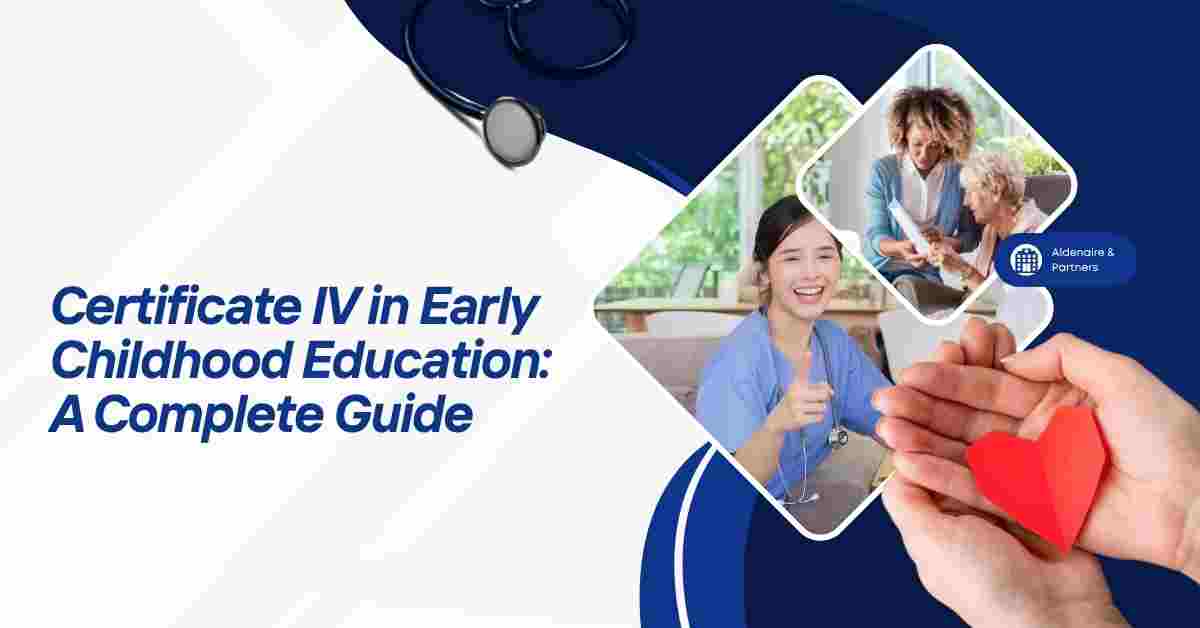Cert 4 in Early Childhood Education: A Complete Guide
Introduction
Australia’s demand for early childhood professionals is steadily rising, driven by population growth, increased awareness of developmental needs in early years, and expanding government initiatives in the childcare sector. The Certificate IV in Early Childhood Education is a highly relevant qualification for individuals passionate about making a difference in children’s lives while establishing a professional career.
In this comprehensive guide, we’ll explore every essential aspect of this certificate, including course structure, benefits, outcomes, career opportunities, and how it fits within Australia’s education and childcare framework.
What is Certificate IV in Early Childhood Education?
The Cert 4 in Early Childhood Education is an intermediate-level qualification aimed at preparing individuals for roles that involve supporting the care, learning, and development of children in early childhood settings. It goes a step beyond Certificate III by introducing supervisory and leadership responsibilities and laying a foundation for further study such as a Diploma or Bachelor’s degree.
This qualification bridges the gap between entry-level roles and more senior positions, equipping students with the skills to contribute meaningfully in a team and, in some cases, lead small groups or projects within a childcare environment.
Who Should Enrol?
This course is ideal for:
- Individuals already holding a Certificate III in Early Childhood Education and wanting to upskill.
- Career changers seeking an impactful, hands-on role in childcare.
- Professionals aiming to take on more leadership or administrative roles in early learning centres.
- Educators planning to pursue a Diploma or Bachelor-level qualification in education or child development.
Entry Requirements
While requirements may vary by institution, typical prerequisites include:
- Completion of Certificate III in Early Childhood Education and Care (CHC30121).
- At least 18 years of age (varies).
- Valid Working With Children Check (WWCC).
- National Police Clearance (optional but preferred).
- English language proficiency (for international students).
Course Duration and Fast-Track Options
The standard completion time for Certificate IV in Early Childhood Education is 12 to 18 months. However, fast-track options may allow students to finish the course in as little as 6 to 9 months, especially for those who:
- Already have industry experience or prior learning.
- Study full-time or through intensive delivery.
- Have completed related units during Certificate III.
Many registered training organizations (RTOs) in Australia offer both online and blended learning modes, increasing flexibility.
What You’ll Learn (Course Units)
The curriculum usually includes a combination of core and elective units. Key learning areas may include:
Core Units:
- Promoting children’s agency and decision-making.
- Supporting inclusion and cultural competence.
- Facilitating emotional and social development.
- Implementing health and safety standards.
- Communicating effectively with families and colleagues.
Elective Units:
- Leading team development.
- Coordinating curriculum planning.
- Responding to child protection concerns.
- Managing children with additional needs.
These units align with the CHC Community Services Training Package, ensuring industry relevance and national recognition.
Work Placement Requirements
All students must complete a mandatory work placement, generally ranging from 120 to 200 hours, in a registered childcare or early learning centre. This real-world experience allows learners to apply theoretical knowledge, develop confidence, and receive feedback from experienced educators.
Learning Modes
You can study the Certificate IV in Early Childhood Education through various delivery formats:
- Online learning with virtual classroom support
- Blended learning (a mix of online and in-person training)
- On-campus classes for structured, face-to-face interaction
Flexible schedules are available for working professionals or parents.
Career Outcomes
Graduates of this course can pursue multiple career paths in the childcare and early education sector, including:
- Early Childhood Educator (Advanced Level)
- Kindergarten Assistant
- Family Daycare Coordinator
- Childcare Centre Assistant Manager
- Out of School Hours (OOSH) Care Worker
With additional experience or study, you may also advance to:
- Centre Director or Educational Leader
- Diploma-level qualifications
- Bachelor of Early Childhood Education
Pathways to Further Education
The Certificate IV in Early Childhood Education serves as a solid foundation for pursuing:
- Diploma of Early Childhood Education and Care (CHC50121)
- Bachelor of Early Childhood Education
- Specialized child psychology or child development courses
These advanced qualifications open doors to teaching roles, policy-making positions, and leadership roles in childcare centres.
Job Outlook and Industry Demand in Australia
According to Job Outlook and Australian government projections:
- Employment in early childhood education is expected to grow strongly in the next five years.
- There is consistent demand for qualified educators in urban, regional, and remote areas.
- Government subsidies and incentives are being offered to encourage upskilling in this field.
This makes Certificate IV a future-proof choice.
Benefits of Studying This Course
- Enhanced Career Prospects: Qualify for higher-paying, senior-level positions.
- Professional Recognition: Nationally accredited under the Australian Qualifications Framework (AQF).
- Flexible Learning: Choose between online, blended, and classroom-based delivery.
- Hands-On Experience: Industry placement gives you practical exposure.
- Personal Fulfillment: Make a real difference in the lives of young children.
Institutions Offering Cert 4 in Early Childhood Education (Australia)
Some of the popular RTOs and TAFEs offering this qualification include:
- TAFE NSW
- TAFE Queensland
- South Metropolitan TAFE (WA)
- Melbourne Polytechnic
- Open Colleges
- Selmar Institute of Education
Each institution may have unique delivery methods, fees, and schedules, so compare your options carefully.
Fees and Funding Options
Course fees vary by institution and may range between AUD 3,500 – AUD 7,500. However, there are multiple funding avenues:
- Government subsidies for eligible students
- VET Student Loans
- JobTrainer funding
- Fee-free TAFE options (available in some states)
Check with your preferred institution to determine what financial assistance you may qualify for.
International Students
International students can also enrol in Certificate IV courses but must:
- Meet English language proficiency requirements (e.g., IELTS 5.5+)
- Hold a valid student visa (Subclass 500)
- Provide academic transcripts
- Pay full international tuition (typically higher)
Studying in Australia also allows for part-time work opportunities while enrolled.
How to Enrol
- Research Institutions: Look for RTOs or TAFEs with strong reputations.
- Check Eligibility: Make sure you meet prerequisites.
- Apply Online: Submit your application through the official website.
- Submit Documentation: Include your ID, qualifications, and WWCC.
- Complete Orientation: Begin coursework and start planning your placement.
Final Thoughts
The Cert 4 in Early Childhood Education is a meaningful step for anyone looking to make a lasting impact in children’s lives while growing a sustainable career. Whether you’re seeking a promotion, preparing for further study, or entering the sector with a stronger foundation, this qualification equips you with the confidence and competence to thrive.
With strong employment growth and increasing national recognition, there’s no better time to invest in a rewarding career in early childhood education.
Read more:







